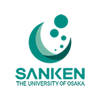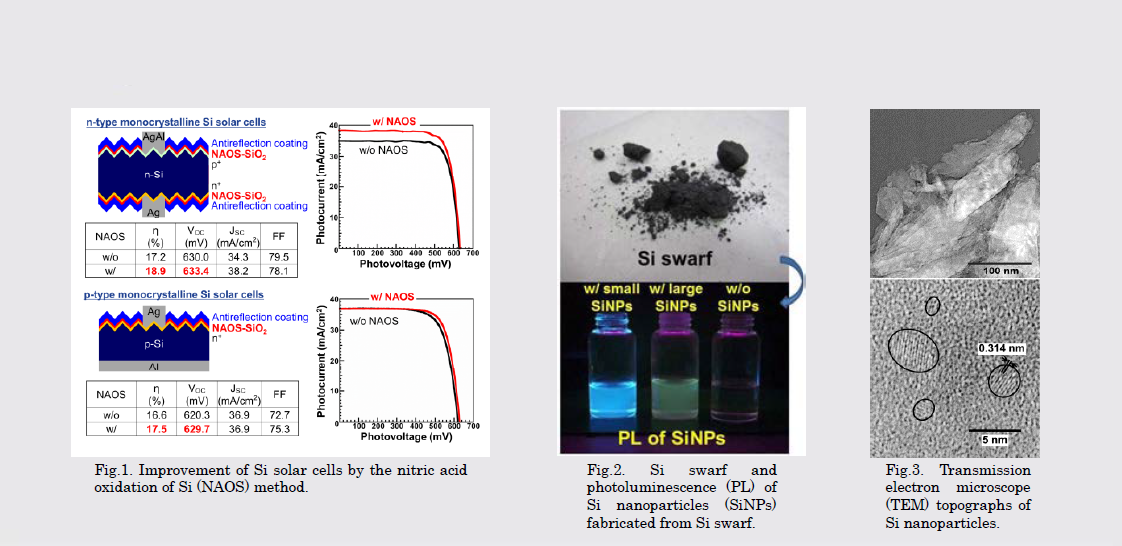
SANKEN
The University of Osaka
大阪大学
産業科学研究所

LAST UPDATE 2017/02/26
-
研究者氏名
Researcher Name松本健俊 Taketoshi MATSUMOTO
准教授 Associate Professor -
所属
Affiliation大阪大学 産業科学研究所
金属有機融合材料研究分野
SANKEN, The University of Osaka
Department of Transcendent materials chemistry -
研究キーワード
Research Keywords表面科学
ナノ材料
シリコン
電池
surface science
nanomaterials
silicon
solar cells and batteries
- 研究テーマ
Research Subject -
シリコン材料に関する表面科学と太陽電池、LED 及び電池への応用
Surface science of Si materials and application to solar cells, light emitting materials, and batteries
研究の背景 Background of the Research
シリコン太陽電池のエネルギー変換効率は、シリコンの界面特性に大きく影響されます。また、太陽電池製造の際に産業廃棄物となるシリコン切粉の再利用が注目されるとともに、量子サイズ効果、表面活性化、表面積増大などを利用したシリコンナノ粒子の応用研究がされています。シリコン太陽電池の効率やシリコンナノ粒子の機能の向上のメカニズムを解明し、応用展開するために、シリコン材料の表面の研究が重要です。
Silicon interface properties greatly affect energy conversion efficiencies of silicon solar cells. A large amount of silicon swarf is generated during slicing silicon ingots for fabrication of solar cells. Silicon nanoparticles have been extensively studied because of their important properties such as wider band-gap due to quantum confinement effect, reactive surfaces and large surface areas. Efficient silicon solar cells and functional silicon nanoparticles can be developed by elucidation of these mechanisms by means of surface science.
研究の目標 Research Objective
シリコン基板表面にある欠陥準位や金属汚染の除去を目的として、硝酸酸化法やシアン化水素水溶液を用いる洗浄法を開発します。シリコン基板と電極の界面反応制御による結晶シリコン太陽電池の高効率化、及びこれらの技術の実用化を目指しています。また、シリコン切粉から作製したシリコンナノ粒子の表面物性を解明し、シリコンナノ粒子の蛍光材料や電池材料としての特性向上と実用化を目指しています。
We are aiming to develop the nitric acid oxidation method and the semiconductor cleaning method using HCN solutions in order to passivate Si defect states and to remove metal contaminants. We also aim to improve conversion efficiencies of crystalline Si solar cells by control of interface reactions between Si substrate and metal electrodes. Our final purpose is to realize the developed technologies in solar cell fabrication processes. We try to apply silicon nanoparticles produced from silicon swarf to light emitting materials and battery materials with investigating surface properties. These techniques are attractive from the viewpoint of industrial application.
研究図Figures

論文発表 / Publications
Sol. Energ. Mat. Sol. C., 234, 298 (2015). Appl. Surf. Sci., 312, 39 (2014). ECS J. Solid State Sci. Technol., 3, Q137 (2014).
J. Nanopart. Res., 16, 2240 (2014). ECS J. Solid State Sci. Technol., 2, Q127 (2013).
研究者連絡先 / HP
- tmatsumo
 sanken.osaka-u.ac.jp
sanken.osaka-u.ac.jp - https://www.sanken.osaka-u.ac.jp/organization/sec/sec02.html